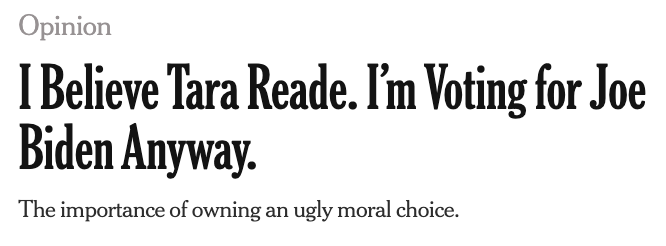Hi there,
The feminist writer and philosopher Linda Hirshman says she believes Tara Reade and is voting for Joe Biden anyway.
A number of people, including friends of mine, are horrified by her argument, but there’s something about it I like.
Oh, I don’t agree with her, at least not about a whole bunch of things. But I like that she is honest and shows her work, such as it is. Her assessment, splashed in the New York Times, goes something like this: She thinks Biden is guilty of sexual assault. She thinks Trump is, too, but the allegations against him are worse. Biden can’t be replaced as the Democratic nominee, and the only way to get rid of Trump is to vote for Biden. Moreover, from a feminist/progressive perspective, a Biden presidency would be preferable to a Trump second term. So for the greater good, she’s going to vote for Biden—but for the sake of her own integrity, she is not going to lie for Joe Biden and pretend he isn’t guilty. The headline and subhead pretty much say it all:

My colleague David French tweeted:
I take his first point, but Hirshman addresses it. She writes:
All major Democratic Party figures have indicated they’re not budging on the presumptive nominee, and the transaction costs of replacing him would be suicidal. Barring some miracle, it’s going to be Mr. Biden.
As for David’s second point, she’s doing precisely that, and it’s pretty clear she agrees it’s gross.
In other words, she’s being honest about the moral compromise she’s making for what she considers to be the greater good. “Suck it up and make the utilitarian bargain,” she writes.
Truth vs. honesty.
Now, I should say that I pretty passionately believe that truth is always at least a partial defense, though it depends on what the alleged offense is. If I say, “Those jeans make you look fat,” I can’t be accused of slander if it’s true. But I can be accused of being needlessly rude. In politics, people routinely confuse rudeness for untruth. As Ben Shapiro likes to say, “Facts don’t care about your feelings.” As a truism, I agree. But often, too many people think giving voice to unpleasant facts is justified solely because it hurts the right peoples’ feelings. And sometimes that translates into a form of organized political asininity.
In other words, there’s a tricky relationship between truth and honesty. It’s very similar to the distinction between an explanation and an excuse. If Hannibal Lecter tells you he eats people because they are tasty and full of protein, that’s an honest explanation—it’s not an excuse. Explaining this distinction is, I believe, is one of the chief tasks of good parenting. If my daughter does wrong and tells me why, I appreciate the honest explanation, but the explanation is not necessarily an excuse for the behavior. George Washington wasn’t right to chop down the cherry tree just because he refused to lie about it.
But I digress. It won’t be lost on anyone who reads Hirshman’s essay that it is an almost perfect mirror of many conservative arguments about the burning need to vote for Trump in 2016 (or 2020). She doesn’t say “binary choice”—never mind scream it—but the logic pervades the whole thing.
I’m not the first to note that there is an interesting symmetry between feminism and social conservatism. Both have a robust, and distinctly American, puritanical streak. Each invests immense moral importance in sexual relations in their own way. For instance, there was time when leading feminists and evangelical leaders shared a common hatred of pornography because each saw an inherent denigration of women and commodification of sex on display.
In 2016, many Christian leaders honestly acknowledged Trump’s moral shortcomings but insisted that the greater good was nonetheless served by electing him. Hirshman is making the same argument from her side of the aisle. Just as those Christians saw a Trump presidency as essential to advancing their agenda and protecting their flock, Hirshman believes Biden would be better for her agenda and her “flock,” as such. If you’re a conservative appalled by her reasoning, you might want to think on that a bit.
What’s admirable is not the argument, but the honesty of it. “How is feminism advanced by casting a reasonably credible complainant as a liar? Better to just own up to what you are doing: sacrificing Ms. Reade for the good of the many.”
What I find interesting and refreshing about Hirshman’s argument is that she explicitly grounds it in traditional philosophical arguments—chiefly, utilitarianism: What is good for the greatest number of people?
(Of course there’s a little question-begging here, in that she assumes that what is best for feminists of her stripe is best for the most people. But that’s her right, just as it is understandable that Christian conservatives believe that what is good for Christianity is consistent with the greater good.).
“Utilitarianism,” she writes, “is not a moral abdication; it is a moral stance.”
And this is where Hirshman loses me. Of course, it depends what one means by utilitarianism. If we came up with a vaccine for COVID-19, and we knew that in .01 percent of cases that the vaccinated person would die, one could make a utilitarian argument for commencing with a national vaccination program. The need to make hard decisions and tradeoffs can be described in utilitarian terms, without subscribing to utilitarian notions of morality.
Friedrich Hayek’s objection to utilitarianism, philosophical pragmatism, legal positivism, and similar doctrines is relevant here. Hayek disliked such schools of thought, because they presupposed perfect or even adequate knowledge on the part of planners, leaders, politicians—choose your label. A just system needs to be grounded in abstract rules of right and wrong, and for Hayek the chief idea was liberty. If instead you choose to organize society around conceptions of ends, coercion is inevitable. This was his point about social justice being fool’s gold. In a free society, the individual is free to pursue his or her own ends (within obvious limits—you can’t murder or steal. etc.). If one person chooses to pursue a career in professional basketball and another chooses to become a poet—and both are successful—the former will likely be far richer than the latter. This doesn’t make the poet unequal to the basketball player in the eyes of God or the law, but it will end up making the basketball player richer than the poet. Hence, some degree of inequality is inevitable in a free society.
If your highest good is economic equality, the basketball player will be penalized and the poet will be subsidized. You might observe that the reverse happens under a free market system. And to a certain extent you’d be right. But who is doing the subsidizing and the penalizing? Free people choosing to buy basketball tickets but not poetry books. In the system desired by ardent practitioners of the cult of social justice, the penalties and subsidies are orchestrated by the state through force and the expropriation of tax dollars.
Obviously I am straying a bit far afield here. But there’s a point: Hirshman argues—via David Hume and John Rawls—that in a situation of extreme scarcity, justice is impossible. Hume “suggested that nobody can be expected to behave justly when trying to survive a shipwreck.” He had a point. When mere survival is the order of the moment, it’s a bit much to ask people to hew to some elaborate system of moral philosophy.
But she uses this analogy to argue for why she has no choice but to do wrong for the greater good. “The Trump administration, and the Republican Party that he represents, are unassailably the political equivalent of Hume’s shipwreck,” she writes. And then she offers her conclusion: “It may not be just, but I’m swimming away from Mr. Trump’s sinking ship as hard as I can. If I have to, I’ll vote for Mr. Biden. I hope I’m not going to drown anyway.”
Do you realize what you just read? It’s the feminist version of the “Flight 93 Election.” One might call it the “HMS Hume Election.”
I won’t recycle all of the reasons why I detested the Flight 93 essay. Instead, I’ll merely point out that they share the same utilitarian spirit. Both are grounded in the idea that one should abandon one’s most cherished positions of moral probity in order to ensure that my team is in charge, or at least to ensure that the other team isn’t. One can readily concede that the argument has ample force while also acknowledging that, if everyone thought this way, we would abandon all pretense to any notions of a higher morality in public life. Politics is solely about a zero-sum calculation about power and the ends we direct it to.
I’m reminded of the philosopher Bertrand Russell’s indictment of philosophical pragmatism. Without resort to some higher ideal than simply “what works,” the only arbiter of a winning argument is power—and taken to its logical extreme, under such a system, “ironclads and Maxim guns must be the ultimate arbiters of metaphysical truth.”
I’m not some purist here. As a practical matter, I don’t begrudge Hirshman for voting for Biden, and I admire the honesty in her reasoning. But it’s worth recognizing that America is suffering from a collective action problem unfolding before its eyes. Hirshman’s theory of feminism is clearly her highest good, just as Christianity is for many of those who opted to acknowledge and then ignore Donald Trump’s behavior. Without gainsaying anyone’s individual choices, it seems nonetheless obvious to me that the world we’ve created is demanding that people compromise their abstract ideals in order to live in it. And the more everyone internalizes the Flight 93 logic, the more that logic becomes the new abstract ideal. And when that happens, the moral rules of scarcity will be the only rules left.
Photograph of Tara Reade by the Associated Press.







Please note that we at The Dispatch hold ourselves, our work, and our commenters to a higher standard than other places on the internet. We welcome comments that foster genuine debate or discussion—including comments critical of us or our work—but responses that include ad hominem attacks on fellow Dispatch members or are intended to stoke fear and anger may be moderated.
With your membership, you only have the ability to comment on The Morning Dispatch articles. Consider upgrading to join the conversation everywhere.